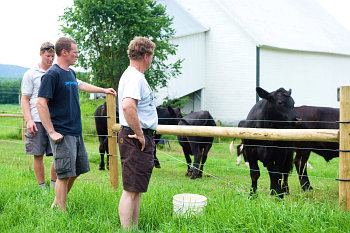Templeton Farm
Contact Us
Templeton Farm
3410 Center Road
East Montpelier, Vt. 05651
802-223-0169
802-461-5352
[email protected]
Preparing Our Beef

Grass fed beef must be prepared and cooked differently than grain fed beef to insure superior flavor. The key thing to remember is that fat in meat acts as an insulator during the cooking process, helping to keep natural meat juices from cooking away. Grass fed beef, being leaner, lacks this fat, and needs a little more attention when cooking in order to maintain its tenderness and juiciness. Don't overcook!
Here are a few basic tips for preparation:
- Most critically, the meat must not be over cooked.
- To avoid over-cooking, the beef should be cooked for less time and at lower heat. If possible, it is better to use meat temperature as the means to monitor the cooking preparation, rather than time of cooking.

- Don't defrost roasts or steaks in a microwave oven - this causes tough spots and reduces moisture. Thaw in your refrigerator for 12-24 hours to allow ice crystals to thaw gradually and be absorbed into the meat before cooking. If you are in a hurry, place the meat in a large bowl of cool water.
- Allow the meat to come to room temperature before cooking. This preparation allows the muscle tissue to relax.
- After cooking, let the beef sit for 10 minutes or more before serving. This too allows the muscle tissue to relax and the meat to become more tender and flavorful.
- Because the meat is very lean, when cooking in a pan, you might need to add a little olive oil, so the meat doesn't stick to the pan.
- Always sear the beef before roasting. This locks in juices and flavor and makes a big difference in the final product.
- To further tenderize and add a flavorful twist to our grass fed beef, try marinading your beef. See marinading related articles within Notes of Interest.

